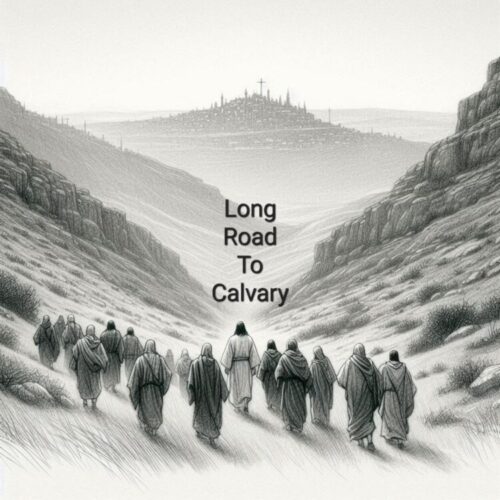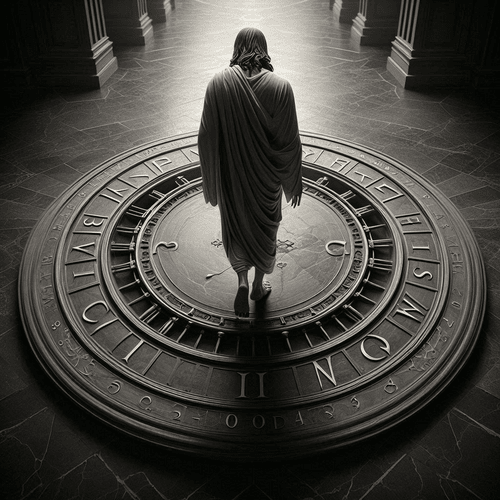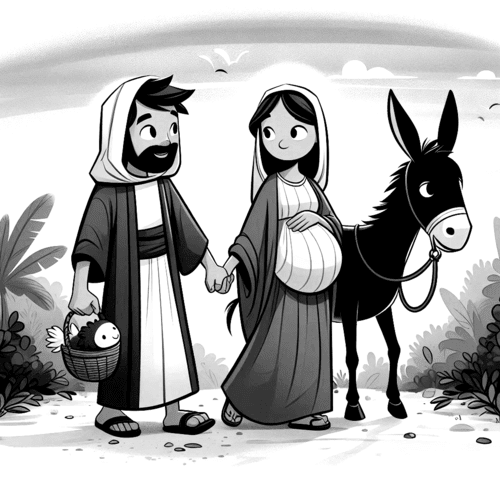Jesus Predicts His Death and Resurrection: Why Must We Care?
Imagine being able to describe in detail the circumstances of your own death—and wait for it, your triumphant return to life—months before they happen. Not as a possibility, not as a fear, but as an absolute certainty. This is exactly what Jesus did, repeatedly and with increasing specificity, as He approached Jerusalem for the last time.
Yet these aren’t just remarkable predictions that happened to come true. They strike at the very heart of who Jesus is and why He came. When we truly grasp their significance, we begin to see how every detail was carefully orchestrated, every moment planned, and every prophecy fulfilled with perfect precision—not by human design, but divine decree. The implications for our faith, our grasp of God’s sovereignty, and our own eternal destiny are staggering…
THE BIBLICAL RECORD OF JESUS’ STAGGERING PREDICTIONS
Jesus’ predictions of His death and resurrection appear multiple times throughout the Gospels, each instance revealing more detail than the last. In Matthew 16:21, we find His first explicit prediction, where He specifies He must go to Jerusalem, suffer at the hands of the elders, chief priests, and scribes, be killed, and rise on the third day. As His ministry progresses, He adds crucial details. In Mark 10:33-34, He reveals He will be delivered to the Gentiles, mocked, spat upon, flogged, and killed, yet rise again after three days. The precision and consistency of these predictions spread across all four Gospels, underscore their significance as more than mere premonitions.
The remarkable specificity in Christ’s predictions extends to details entirely beyond human control. Sample these: He accurately foretells Judas’ betrayal, Peter’s denial, and the precise manner of His death, including details that only Roman execution would entail. These weren’t broad, Nostradamus-style predictions, but precise prophecies that would require orchestration far beyond human capability to fulfil.
THE SOVEREIGNTY OF GOD IN CHRIST’S PREDICTIONS
- God’s Eternal Decree and Its Timely Unfolding: Christ’s predictions reveal that His death wasn’t a tragic accident but part of God’s eternal plan set before the foundation of the world. Every prediction Jesus made aligned perfectly with the Father’s predetermined purpose, demonstrating that the cross was not Plan B but the very heart of God’s redemptive strategy. This understanding transforms our view of the crucifixion from a seeming triumph of evil to the perfect fulfillment of divine wisdom.
- How These Predictions Demonstrate Divine Sovereignty: The fulfillment of these predictions required control over countless independent agents—Roman authorities, Jewish leaders, crowds, disciples, and natural events. Every detail Jesus foretold came to pass exactly as He said, proving God’s sovereign control over both human decisions and natural circumstances. The precision of fulfillment demonstrates God’s sovereignty extends even over evil human actions, though He remains untainted by them.
- The Intersection of Human Free Will and Divine Purpose: These predictions beautifully display how God’s sovereignty works alongside human responsibility. While Judas freely chose to betray Jesus and Pilate freely chose to condemn Him, their choices fulfilled God’s predetermined plan. This mysterious intersection of divine sovereignty and human responsibility shows us God accomplishes His purposes not by overriding human will, but by working through it in ways beyond our comprehension.
THE THEOLOGICAL SIGNIFICANCE
Confirmation of Christ’s Deity: Jesus’ ability to predict these events with perfect accuracy demonstrates His divine nature. No human prophets could have known and controlled such specific details about their own death and resurrection. These predictions reveal Christ’s divine omniscience and His eternal existence with the Father before time began.
Demonstration of Voluntary Sacrifice: The predictions prove Jesus went to the cross willingly and knowingly. Rather than being caught by surprise or trapped by circumstances, Christ walked steadily toward His death with full understanding and purpose. He wasn’t the victim of a human plot: He laid down His life of His own will. The voluntary nature of the sacrifice magnifies both its love and its efficacy. Christ’s unwavering march toward the cross, fully aware of its horrors, underscores His profound love for humanity and His commitment to fulfilling God’s redemptive plan.
Evidence of the Trinity’s Unified Plan of Redemption: In these predictions, we see perfect harmony between the members of the Trinity. The Father’s eternal plan, the Son’s willing submission, and the Spirit’s empowering presence all work together in perfect unity. Each prediction reveals more of this divine cooperation in accomplishing our salvation.
Fulfillment of Old Testament Prophecies: Christ’s predictions not only foretold future events but also demonstrated how He would fulfil numerous Old Testament prophecies. His awareness and intentional fulfillment of these prophecies shows He was the promised Messiah, perfectly accomplishing everything written about Him in the Law, Prophets, and Psalms.
THE NECESSITY OF THE CROSS: GOD’S PLAN MEETS HUMAN NEED
The disciples’ stubborn disbelief of Jesus’ predictions—especially Peter’s sharp rebuke—powerfully authenticates the gospel accounts. No fabricated story would portray its leaders so persistently failing to grasp their Master’s central message. The gospels’ harmonious yet distinct records of these predictions and the disciples’ responses bear the hallmarks of genuine historical testimony, with each account complementing rather than contradicting the others.
These predictions underscore an uncomfortable truth: our total depravity demanded nothing less than the death of God’s Son as our penal substitute. When Jesus repeatedly said He “must” go to Jerusalem, suffer, and die, He wasn’t describing one possible path to salvation—He was declaring the only way that could satisfy both divine justice and mercy. Our complete inability to contribute to our own salvation required Christ’s perfect substitutionary sacrifice, making these predictions not just demonstrations of divine foreknowledge, but declarations of the necessary price of our redemption.
ADDITIONAL KEY ARGUMENTS
- Historical Credibility: The historical credibility of the Gospel accounts is reinforced by the fact that multiple independent sources document Jesus’ predictions and their fulfillment. This bolsters the authenticity and reliability of these events.
- Role of Witnesses: The testimonies of numerous witnesses, including the apostles and over 500 others, provide compelling evidence of Jesus’ resurrection. Their firsthand accounts strengthen the case for the resurrection’s historical validity (1 Corinthians 15:6).
- Impact on Early Church: The fulfillment of Jesus’ predictions transformed the early church. The once-fearful disciples became bold evangelists, willing to face persecution and death, showcasing the profound impact of the resurrection on their lives and ministries.
JESUS PREDICTS HIS DEATH AND RESURRECTION—THE REFORMED UNDERSTANDING
The Reformed perspective sees in Jesus’ predictions the clearest possible demonstration of God’s absolute sovereignty over all events, including human decisions and actions. These weren’t just prophetic glimpses into a possible future, but authoritative declarations of God’s unchangeable decree. That Jesus could predict not only His death but its precise nature and timing—involving the free choices of Judas, the Sanhedrin, Pilate, and countless others—reveals God’s sovereignty extends over even the most wicked human actions, while maintaining human responsibility for those actions.
This understanding connects powerfully to the doctrine of limited atonement – Christ knew exactly for whom He was dying, and His predictions reveal His intentional, purposeful march toward accomplishing their redemption. Each prediction shows Christ’s active role in securing the salvation of His elect, demonstrating that His death wasn’t a general possibility of salvation for all, but an actual accomplishment of salvation for His chosen people.
JESUS PREDICTS HIS DEATH AND RESURRECTION—CONCLUSION
Such profound truth demands a response. For believers, these predictions should deepen our trust in God’s sovereign control and strengthen our assurance—the same God who orchestrated every detail of Christ’s death and resurrection holds every detail of our lives in His hands. They should also fuel our worship, knowing Christ walked willingly toward the cross with full knowledge of its horrors, driven by love for us, His people.
For those who haven’t embraced Christ, these predictions present a compelling challenge: here’s a man who knew and declared exactly how He would die and rise again, then fulfilled every detail. This leaves no middle ground—either Jesus is exactly who He claimed to be, the sovereign Lord worth trusting with your eternal destiny, or His predictions mark Him as deluded or deceptive. The evidence points overwhelmingly to His deity and trustworthiness, inviting you to entrust yourself to the One who demonstrated such perfect control over even death itself.
JESUS PREDICTS HIS DEATH AND RESURRECTION—RELATED FAQs
If God sovereignly ordained Christ’s death, why are Judas and the Jewish leaders guilty? God’s sovereignty works through, not against, human responsibility. While God ordained these events, each participant acted freely according to their own desires and motives. Their guilt lies in their evil intentions and choices, even though God used these for His good purposes.
- Why did Jesus predict His death multiple times instead of just once? The repetition served multiple purposes—it emphasised the certainty of these events, gave multiple opportunities for the disciples to understand, and demonstrated increasing detail in the predictions. Each prediction also addressed different aspects of Christ’s mission and reached different audiences.
- How do Jesus’ predictions relate to Old Testament prophecies? Jesus’ predictions often deliberately echoed and fulfilled Old Testament prophecies, particularly from Isaiah 53 and Psalm 22. His predictions showed He was consciously fulfilling these prophecies, demonstrating His role as the promised Messiah.
- If these predictions were so clear, why did the resurrection surprise the disciples? Their surprise demonstrates the depth of human spiritual blindness apart from divine illumination. Even clear truth cannot penetrate hearts until God opens them, showing our total depravity, our need for divine grace to understand and respond.
How do the predictions demonstrate the Trinity’s unity? The predictions reveal perfect harmony between the Father’s plan, the Son’s willing submission, and the Spirit’s enablement. Jesus consistently connects His predictions to the Father’s will, showing unity of purpose within the Trinity.
- Does Jesus’ foreknowledge of His death make His suffering less real? No—His foreknowledge actually intensified His suffering, as He lived with the conscious awareness of what awaited Him—a fact corroborated by His agony at Gethsemane. His willingness to proceed despite this knowledge magnifies His love.
- How should these predictions impact our view of suffering? They teach us suffering in God’s plan is never meaningless or outside His control. Just as Christ’s suffering served God’s purposes, our suffering under God’s sovereignty always works toward His good ends.
- What role did the predictions play in the early church’s witness? They formed a crucial part of the apostles’ testimony, demonstrating that Jesus was no victim of circumstances but the sovereign Lord who orchestrated His own death and resurrection for our salvation.
- How does limited atonement relate to these predictions? Christ’s specific predictions show He knew exactly who He was dying for and what His death would accomplish. This supports the Reformed understanding that Christ’s death effectively secured salvation for His elect rather than merely making salvation possible for all.
What do the predictions tell us about God’s relationship to time? They demonstrate God’s complete sovereignty over time and history. While we experience time linearly, God ordains and knows all events, past, present, and future, showing His transcendence over time itself.
JESUS PREDICTS HIS DEATH AND RESURRECTION—OUR RELATED POSTS
Editor's Pick

The Christian Sabbath: Why Did Sunday Replace Saturday?
Consider this: God-fearing Jews who’d faithfully observed Saturday Sabbath for over a thousand years suddenly began gathering for worship on [...]

Did the Early Christians Worship Jesus? The Biblical Evidence
It was a startling transformation: Jewish fishermen who'd spent three years following this itinerant carpenter from Nazareth now begin to [...]

If Jesus is Messiah, Why Aren’t ALL Messianic Prophecies Fulfilled?
If Jesus is truly the Messiah, why hasn't world peace arrived? Why do Jews still face persecution? Why isn't the [...]

When Courage Fails: Will I Be Forgiven If I Deny Christ in Persecution?
The rooster crowed, and Peter remembered. In that devastating moment, the apostle realised he’d just done the unthinkable—three times he’d [...]

What Makes a Godly Dad? 5 Biblical Principles Fathers Need
Modern culture sends fathers mixed messages. Be strong but sensitive. Be involved but not overbearing. Lead but don’t dominate. With [...]

What Makes a Godly Mom? A Scripture-Backed Guide
In our culture’s confusion about gender roles and parenting, the timeless question remains: what makes a godly mother? While secular [...]

Paul’s Mandate for Men: Headship Or Servant Leadership? Or Both?
Modern Christianity has fallen into a trap. We've created an either/or battle between "headship" and "servant leadership," as if these [...]

Should We Stop Using Male Pronouns for God? Why Do We Say No?
A friend of ours arrived eagerly at his first theology class in seminary. But he quickly discovered something troubling: the [...]

Did Old Testament Law Force Women to Marry their Rapists?
**Editor’s Note: This post is part of our series, ‘Satan’s Lies: Common Deceptions in the Church Today’… Viral misinformation abounds [...]

From Danvers To Nashville: Two Statements, One Biblical Vision
30 years separate the Danvers Statement on Biblical Manhood and Womanhood (1987) and the Nashville Statement on Human Sexuality (2017). [...]
SUPPORT US:
Feel the Holy Spirit's gentle nudge to partner with us?
Donate Online:
Account Name: TRUTHS TO DIE FOR FOUNDATION
Account Number: 10243565459
Bank IFSC: IDFB0043391
Bank Name: IDFC FIRST BANK






